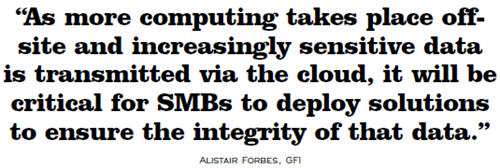Small Companies Face Big Security Challenges
By Brian Albright, Business Solutions magazine.
VARs can help SMBs better manage network security.

The range of potential digital security threats continues to expand as more companies bring operations online, adopt cloud technology and mobile computing platforms, and struggle to adapt to employee use of personal computing devices and social media sites. Large enterprises protect themselves from these threats using a host of different security solutions, but SMBs are also targets and require robust security solutions.
“The newspapers report only when a large brand has been hacked,” says John Keenan, vice president of North American sales at SonicWALL. “But every single day, hackers exploit a security weakness of an SMB. What’s worse, smaller companies don’t have the financial resources to recover from such a breach, and they’re forced to go out of business, because someone hacked into their POS system or similar and stole $30,000.”
This is where VARs have an opportunity to expand their SMB offerings or to tap into new markets for their existing security offerings. “VARs are the lifeline for their SMB customers and can guide them in knowing what needs to be protected by helping them deploy reliable security solutions that will help them enforce strong password policies, secure email and Web assets, and encrypt information,” says Randy Cochran, vice president of channel sales for the Americas at Symantec. “VARs will also need to help their customers stay up to date on new threats and educate employees on policies and procedures to protect valuable data.”
Web-Based Solutions And Managed Services Appeal To SMBs
A number of technology advancements have made it easier to craft affordable security solutions for smaller businesses. Web-based applications, in particular, have reduced the cost of entry for robust security and Internet usage controls.
This is becoming more important as small businesses struggle to get a handle on employee use of company computing assets to access social media sites, play games, and stream music and video. “Because payroll is the largest cost center for most SMBs, employee productivity and secure access are top concerns when implementing an Internet usage policy,” Keenan says. “Increasingly, SMBs are relying on Web-based applications to run their businesses more efficiently, and bandwidth controls are now a necessity to maximize network and application performance.”
SMBs can also benefit from the types of managed security services made possible by cloud-based or hosted solutions, the introduction of application intelligence and control, and intelligent firewall solutions. “Managed patch management and antivirus solutions are especially important for SMBs seeking to protect themselves from the viruses, adware, spyware, worms, rootkits, and other malware running rampant online,” says Alistair Forbes, general manager of GFI Software’s GFI MAX Business Unit. “By offloading the responsibility of managing network security to an outside company, SMBs are able to devote their attention to meeting their own unique business goals. Integrated services provide further assurance that the solutions responsible for vulnerability management and network protection are working in unison and require minimal effort on the customer’s part.”
Since hosted solutions require less up-front investment, smaller companies have come to rely more and more on these systems during the recent recession. “Software as a service (SaaS) is a way to deal with the uncertain economy as it is a scalable, pay-as-you-go model,” Cochran says. “In particular, SaaS is becoming an increasingly viable solution for addressing customers’ security, IT, and information management challenges. This creates new opportunities for partners to generate recurring revenue streams and gain insight into customer operations through the management of their IT environments.”

The economy has led to some project cancellations as well as longer sales cycles, but “most SMBs realize they need to keep their security solutions current, with the risk of not doing so far outweighing any short-term gains,” Forbes says.
Cloud, Mobile Technologies Present New Security Challenges
SMBs often have unique business models and require customized solutions. They are also more vulnerable to swings in the economy and are therefore very price-conscious. Solutions that are easy to install and manage, and that automate manual tasks, are especially appealing to companies in this size bracket, and vendor stability is important.
The advent of low-cost mobile computing platforms has also had a large impact on small businesses. It’s much easier now to quickly deploy mobile applications, often using consumer-grade devices, or even employees’ personal mobile phones. VARs have to be able to provide their customers with a secure mobility platform that utilizes the proper authentication, access, and application controls. “With hackers increasingly targeting mobile devices, an infected mobile phone or laptop can bring down an entire network,” Keenan says.
Companies have to create and enforce security policies around mobile devices and ensure that antivirus software is kept up to date. Cloud computing solutions will also have to be monitored.
“As more computing takes place off-site and increasingly sensitive data is transmitted via the cloud, it will be critical for SMBs to deploy solutions to ensure the integrity of that data,” Forbes says. “SMBs also need to do their due diligence when selecting cloud providers, challenging them to demonstrate what they are doing to protect your data.”
This presents VARs with a significant opportunity to help customers secure their information and their employees’ devices against malware threats. “The threat landscape continues to expand, creating a greater need for reputationbased security technology solutions to help customers stay ahead of attackers,” Cochran says. “Mobile devices that store confidential business information and are lost or stolen present another big challenge, not to mention the difficulty of managing these devices and determining how much access they may have to the company infrastructure. SMBs will need guidance from VARs to choose the right security policies and technology solutions that will keep their information safe.”
SMBs Targeted By Cyber Criminals
Part of that guidance will include educating SMBs about the scope of the threats they face and how best to deploy their security solutions. Many smaller companies think their size makes them less of a target, but that is not the case. “According to Symantec’s recent SMB Threat Awareness Poll, 50% of SMBs do not think they are a target of cyber attacks, and yet research shows 73% of SMBs experienced a cyber attack in the past year,” Cochran says. “VARs can help SMBs recognize the threats to their business data and find the best way for them to protect that data.”
These companies also think they can deploy security solutions on their own, since the scope of the implementation is fairly limited. Usually these companies quickly realize that they need outside help. “SMBs quickly determine they are heavily reliant on their VARs to assist with this process; thus managed services offers an affordable alternative,” Keenan says. “Also, not all firewalls are the same. A typical, inexpensive stateful packet firewall purchased at one of the big box stores will not provide the level of protection, performance, and control required by today’s SMBs. Dynamic security updates that require no action from the customer are necessary to provide a continuous level of protection.”
VARs can assist companies with developing security plans, assessing the existing infrastructure, and educating employees about new policies. VARs and integrators can also help ensure patch management is handled correctly and system updates are regularly performed.
“It is a common misperception that you need to have a large IT staff and unlimited budget in order to implement a comprehensive security strategy,” Forbes says. “VARs and [managed service providers] offer the same robust support, services, and solutions available to larger IT companies at a price point SMBs can afford. Managed solutions also enable SMBs to keep their network and operating systems running smoothly, while requiring minimal IT resources.”
